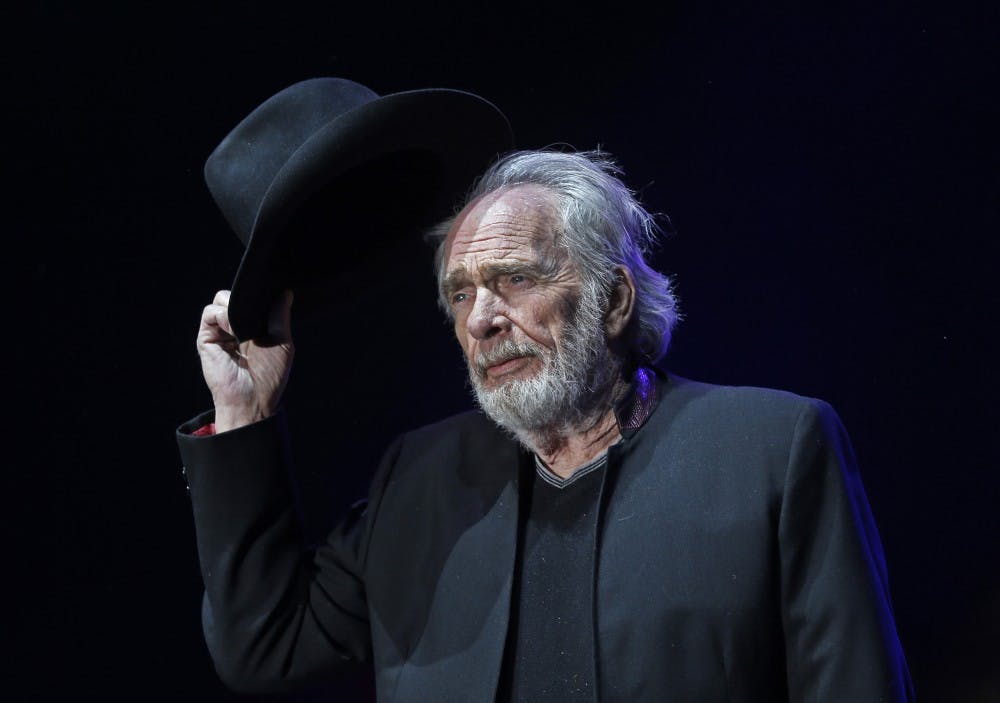Yesterday, I almost cried over an AP alert in the hair care aisle at CVS.
Merle Haggard, one of country music’s most successful artists and the voice of country counterculture in the 1960s and 1970s, died Wednesday on his 79th birthday.
Haggard wasn’t just a country singer. He was the country singer. He was cutting his stuff out of Bakersfield, California, not Nashville. His sound was rougher, more raw.
He was country’s outlaw, and with his band, the Strangers, spent decades releasing songs that made country music history. His music was authentic, none of this cookie-cutter sameness and “bro country” that defines the Billboard charts today.
When he wrote about turning 21 in prison in “Mama Tried,” he meant it. He spent his 21st birthday in solitary confinement at San Quentin State Prison, doing time for burglary. He talked openly about his prison time.
He was in the audience when Johnny Cash famously performed at San Quentin in 1958.
And that authenticity resonated with listeners.
From 1966 to 1987, 38 of Haggard’s singles hit No. 1 on the Billboard country chart, according to the New York Times. What’s more, 71 of his songs were Top 10 hits, 34 of them in a row from 1967 to 1977.
Since 1963, he's recorded more than 70 albums, according to Rolling Stone. His 1970s hit “Today I Started Loving You Again” has been covered by more than 400 artists. He was inducted into the Country Music Hall of Fame in 1994 and was a Kennedy Center honoree in 2010.
But all those numbers and all those accolades don’t even begin to touch what Haggard’s music meant to me. Say what you will about country music, but my love for Haggard’s work goes much deeper than just a song on the radio.
“Mama Tried,” “Swinging Doors” and “Bottle Let Me Down” sound like summertime. They feel like ice cream running down your arm and chocolate on your face and smell like sweat and sunscreen and campfire smoke. My dad and his friends used to croon these songs during camping trips when my sister and I were young.
“Silver Wings” feels like loss and resilience. It opens the door to the deepest place of my heart and was the first shining glimmer of hope during some of the hardest days of my life.
“Daddy Frank (The Guitar Man),” “Sing Me Back Home” and “Okie from Muskogee” smell like unfiltered Camel cigarettes and peanut butter cookies and taste like popcorn and Diet Coke.
Songs like this were the soundtrack to my teenaged Friday nights, when I would opt to spend my evenings with my Pappaw, my grandfather, my best friend and closest ally.
“Today I Started Loving You Again” tastes like teardrops and mascara, and feels like the edge of a dog tag digging into your palm and the feeling your lungs are going to collapse. It was the song playing in the room as my family and I watched Pappaw take his last breaths in March 2014.
There has never been a time when I wasn’t listening to Merle Haggard. His voice and his music were so strongly woven into the fabric of my life that he’s become a part of who I am.
In an interview last year with Men’s Journal, Haggard was asked what he wanted his legacy to be. His response?
“I don’t know. It’s not over yet.”
As with any other artist who dies, there’s a lot of talk of legacy going on right now. Haggard’s career has already changed the landscape of country music and touched lives around the world and no doubt will continue to do so. That’s the beauty of it.
It’s not over yet.
Holly Hays
@hollyvhays




